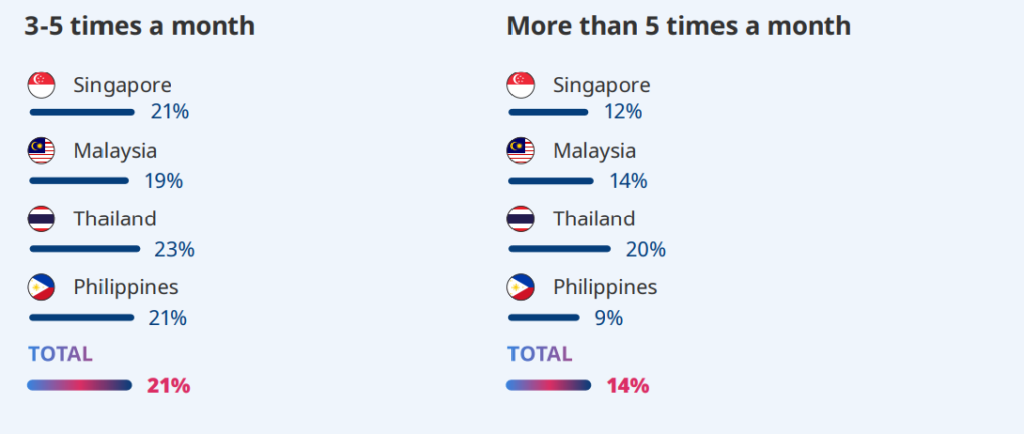
Shopping tags allow users to browse and Southeast Asia sees exhilarating rise in social commerce. Source: Shutterstock
Southeast Asia sees exhilarating rise in social commerce
- Social media has surpassed physical retail to become the second most popular shopping format in the region, second only to e-commerce.
- Singapore, Malaysia, Philippines, and Thailand top the charts in the number of times shopped online in a month.
- Overall social commerce’s revenue per order rose 88% during the first two quarters of this year.
In this day and age, the opportunity for social media as a sales channel is too enormous to be ignored. Especially when it comes to Southeast Asia (SEA), data by Bain & Co. shows social commerce accounting for close to half (44%) of the region’s U$109 billion e-commerce market last year alone. It is not surprising, considering how the region is home to the highest internet penetration rates in the world.
What is surprising however, is the fact that for the first time, shopping via social media has surpassed traditional retail to become the second most preferred shopping method in SEA. In a recent annual report by iKala titled ‘Riding the Pandemic Wave & Beyond’, within the first half of this year alone, orders and Gross Merchandise Value (GMV) in the region’s social commerce sector jumped 102% and 91%, respectively, compared to the same period last year.
iKala, an AI-based solution provider, said in a statement that even with Covid-19 restrictions in many parts of Southeast Asia, the pace of growth for social commerce shows few signs of slowing. “If anything, more people are spending more of their time discovering, considering and purchasing products within the social media ecosystem,” the statement reads.
The report is based on a survey of 1600 social shoppers and more than 23,600 business customers (social sellers) across Thailand, Malaysia, Philippines and Singapore, conducted in the first two quarters of 2021.
Social commerce accelerates in SEA
While e-commerce (91%) overwhelmingly remains the preferred channel for shoppers in Southeast Asia, social commerce (78%) is emerging hot on its heels, the report states, even outstripping traditional retail by a country mile (35%).
“In fact, as many as 42% of total shoppers said they use social media to make purchases 1-2 times per month, and 35% use it shop more than 3 times a month,” iKala noted. To top it off, revenue per order rose 88%, a staggering amount that reflects how consumers weren’t just buying more on social media, but also spending more on every order.

How often do you shop using social networks? Source: iKala
CEO and co-founder of iKala, Sega Cheng, believes that because “Southeast Asia already has some of the most avid social media users in the world, and spurred by the pandemic, they’ve taken to social platforms for their shopping needs at an exhilarating pace. Even as brick-and-mortar reopens, Cheng said it’s become clear that social commerce is not a phase — the ease, convenience and accessibility of this format has earned it a permanent place in the way this region shops.”
It is fair to note that shopping on social platforms is not friction-free. Based on the study, consumers across the region report expensive shipping (51%), no return and exchange policies (41%) and a lack of customer service (34%) as key points of friction.
Even different payment preferences across the region contributes to some friction. “Consumers in Singapore and Malaysia rely much more on credit cards and digital wallets respectively, while those in Thailand and the Philippines prefer cash on delivery (COD),” the report highlighted.
Cheng noted that despite how navigating consumer expectations poses challenges, more retailers are starting to leverage emerging tools and technologies to make the customer journey seamless. “As the landscape matures, sellers who are quick to adopt effective solutions to eliminate pain points will be able to retain engagement and trust in the long run,” he added.
READ MORE
- Micron Technology invests RM1 Million for semiconductor research at Malaysian universities
- Shein, Shopee and Meesho overtake Amazon in 2021
- Data security is an expectation for APAC consumers
- Malware exploits Microsoft’s e-Signature verification
- What’s spooking Tencent and making them sell their shares off?


